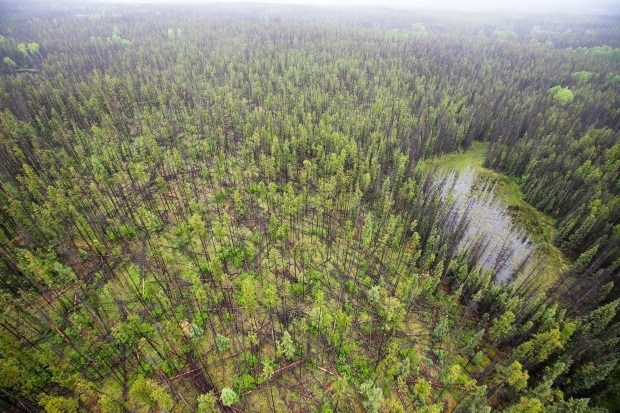
Opinion: Tree-farm licences a failure in forest management
"The only evident plan [of the BC government] is to keep the rates of timber harvesting unsustainably high, thereby making the eventual collapse of available timber even more painful for forest-dependent communities, a policy based on the premise that it is better to have more jobs today and none tomorrow rather than fewer jobs today and some tomorrow.
...the government is preoccupied with rewarding an oligopoly of companies with exclusive timber rights over public forests within quasi-private timber farms (Tree Farm Licences)
In its zeal to justify further enclosure of The Commons and increased corporate control over the commoners’ timber, the government’s twisted thinking becomes so bent that it defines mountebank politics."
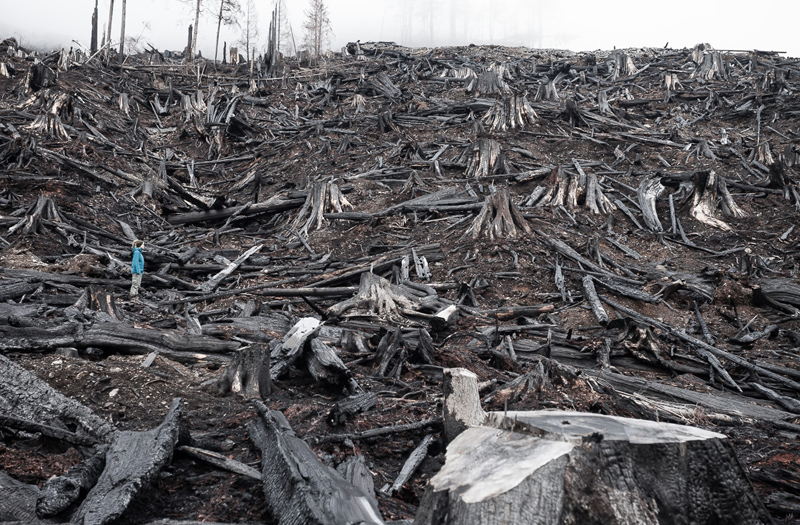
Photo of Burnt Vancouver Island Clearcut Chosen for Exhibition in International Photography Competition in London
Tragic photo of a logged and burnt old-growth forest on Vancouver Island, taken in January by Ancient Forest Alliance photographer TJ Watt, highlights the environmental destruction taking place in British Columbia’s “Tree Farm Licences” (TFL’s). The BC government’s plan to expand TFL’s to give exclusive logging rights to major logging companies on BC’s public lands is in its final week of public input. The image has chosen by the Atkins CIWEM Environmental Photographer of the Year competition to be featured in an exhibition this summer at the Royal Geographical Society in London and around national forest venues across England.
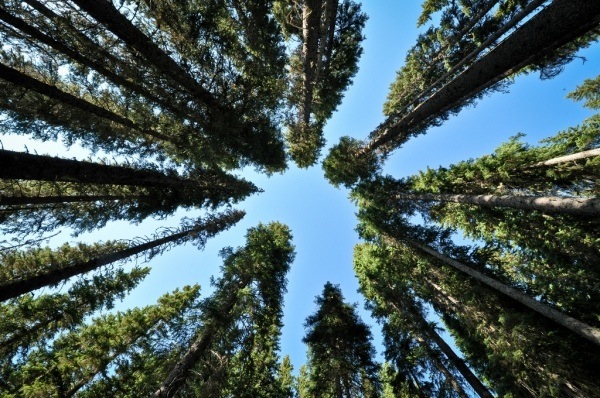
B.C. forest giveaway threatens to speed up collapse
"How did we get to this point? It is no secret that this redressed proposal is especially aimed at companies operating in the Interior. After the mountain pine beetle epidemic, the province allowed a significant increase to the annual cut to deal with massive quantities of dead or dying trees in this region. But that process has almost run its course: dead wood is running out and forest companies are cutting down more and more living trees, also known as green timber. In a headline-making case, West Fraser and Canfor took one million cubic metres of green timber over and above the allocated cut, without penalty by the B.C. government."
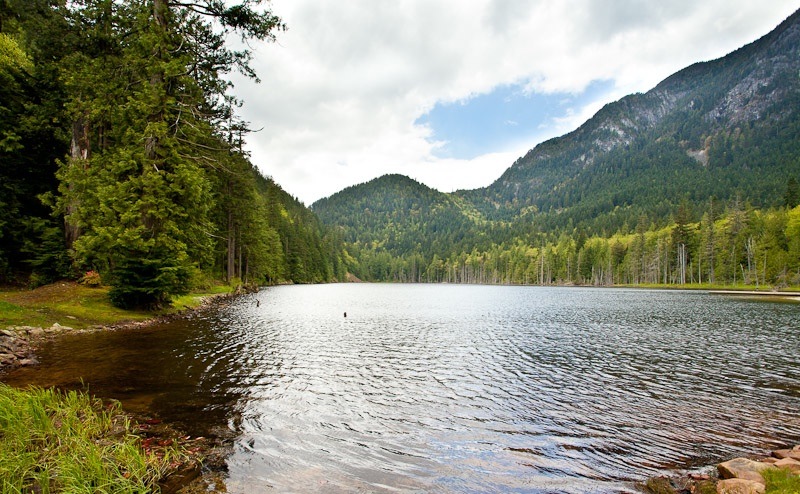
Echo Lake BIODIVERSITY BLITZ! Sat May 31 – Sun June 1, 2014
THIS WEEKEND, join the Ancient Forest Alliance along with a group of biologists and environmental experts for a weekend of biodiversity surveys, a guided walk and nature talks at Echo Lake. Located between Mission and Agassiz east of Vancouver, Echo Lake is a spectacular and endangered lowland old-growth forest. Come out to experience and learn about this unique ecosystem and find out more about the birds, amphibians, mammals, plants, fungi, and other living things that make Echo Lake their home!
Saturday, May 31st, 1:30pm-5pm: Citizens Science Day
• Searching for Amphibians! with Barb Beasley
• Fungi Walks! with Erin Feldman, and Adolf & Oluna Ceska
• Mossome Mosses and Other Awesome Plants!
Sunday, June 1st, 1:30pm-5pm: Biodiversity Nature Walk
Learn about old-growth forest characteristics and ecology, plant ID, forest-canopy research, and more!
**See details for meeting times & locations!**
**Participants should pre-register for either or both days by sending an email to info@ancientforestalliance.org and indicate which day (either or both) they would like to attend.
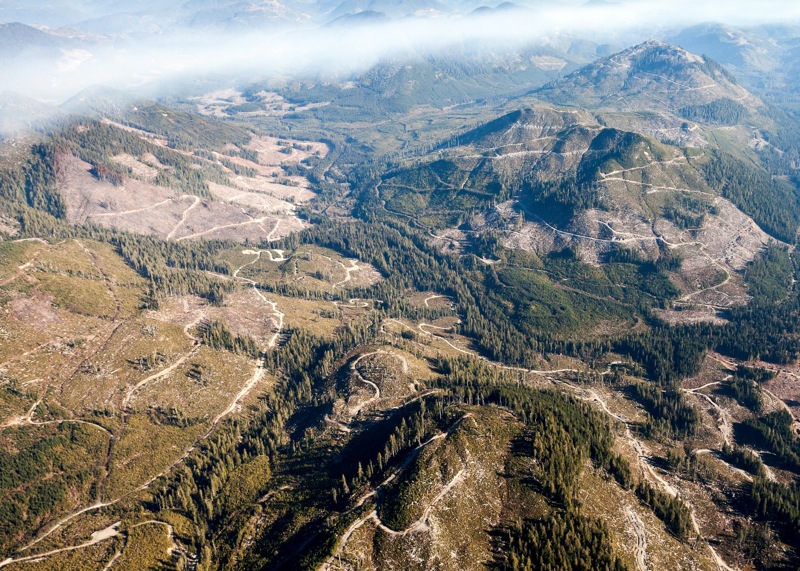
Forest Giveaway Plan for Timber Companies Threatens BC’s Public Forest Lands! Please SPEAK UP Now – May 30 noon Deadline!
In April, the BC Liberal government revived their proposal to allow major logging companies to receive exclusive logging rights over vast areas of public forest lands through the expansion of Tree Farm Licences. Despite being killed by widespread public opposition in 2013, they’ve resurrected this “forest giveaway scheme” like a zombie, in a bid to increase property rights for timber corporations on our public lands. These lands are vital for wildlife, recreation, scenery, clean water, wild salmon, First Nations, and small forestry operators.
Go to www.BCForestMovement.com and see here for more ways to speak up!
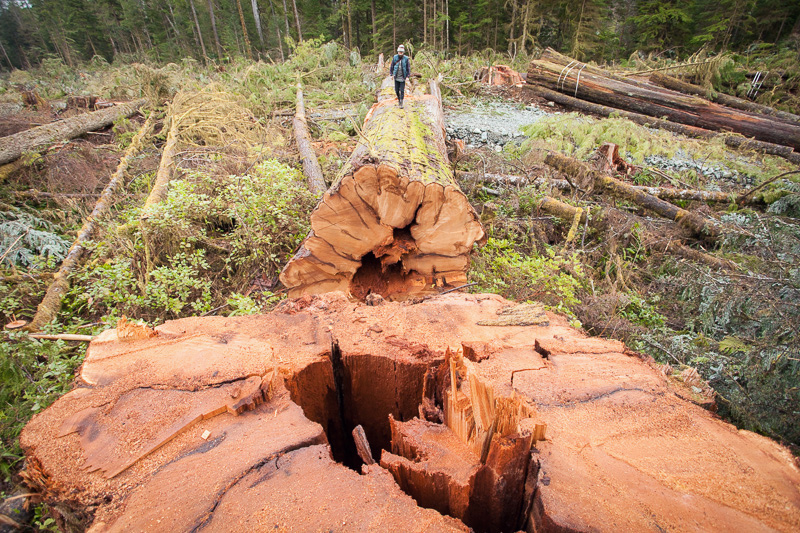
Submission by Vicky Husband to the BC Government’s TFL-Expansion Plans
"TFLs have always enabled monopolistic corporate control of our public forests and, over the long term, have not maintained the public benefits that were promised when they were awarded. The sorry state of BC’s coastal forests and coastal forest industry, where the majority of current TFLs exist, provides all the evidence needed to reject the creation of any more TFLs..."
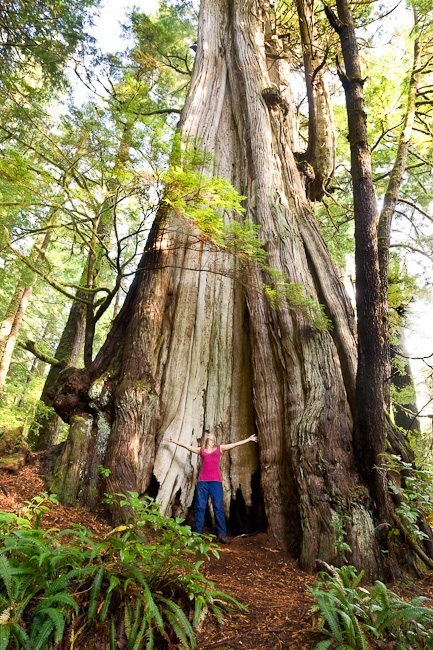
Thank You to Earth Day Local Business Fundraisers!
On behalf of B.C's endangered old-growth forests, we'd like to say 'Thank You' to all of the local businesses who held an event to support us on Earth Day, April 22nd: North Park Bike Shop, Ananda Ayurveda, Cafe 932, and the Grassroots Eco-Salon. The AFA is supported by thousands of individual donors and small and independent businesses who allow us to continue our forest-saving campaigns. Thank you so much for your support!
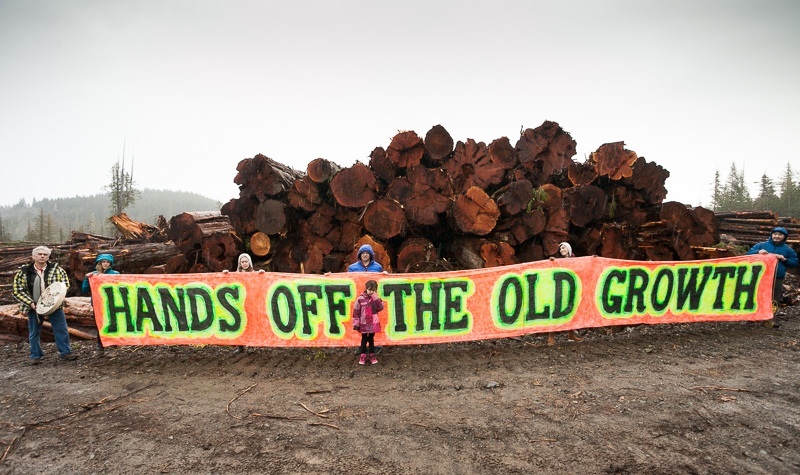
*POSTPONED* Date TBA: Kwakiutl First Nations Community RALLY in Port Hardy
A community rally will be held sometime in the near future by the Kwakiutl First Nation band in Port Hardy on northern Vancouver Island, asking the BC government and major forest companies to respect their land and their treaty. The rally will be in regards to Island Timberlands' logging of a 700 year old ancient redcedar forest near their reserve in late December without consulting the band.
Take Action
 Donate
Donate
Support the Ancient Forest Alliance with a one-time or monthly donation. Send a Message
Send a Message
Send an instant message to key provincial decision-makers.Get in Touch
Earth-Friendly Web Design by Fairwind Creative
- Home
- About Us
- Our Work
- Ancient Forests
- Recent News
- Photos & Media
- Map of Gallery Regions
- Themes
- Videos
- Inland Rainforest
- Mainland
- Haida Gwaii
- Sunshine Coast
- Sunshine Coast: Powell River
- Vancouver Island South
- VI South: Caycuse Watershed
- VI South: Mossy Maples
- VI South: Port Renfrew
- VI South: Port Alberni
- VI South: Walbran Valley
- Vancouver Island Central
- VI Central: Clayoquot Sound
- VI Central: Cortes Island
- VI Central: Tahsis
- Vancouver Island North
- Take Action
- Store
- Donate
